The selection of techniques and crops can determine the environmental impact and economic cost of rooftop gardens

Urban agriculture is growing in extension and popularity in cities of developed countries, like New York or Berlin. In the last years, the roofs of buildings have been colonized as food production spaces, particularly in highly dense cities (for example, Singapore). The roofs of buildings are usually unused spaces that make it possible to considerably increase the productive area of cities without competing with urban development. Mainly socially-oriented, rooftop gardens are a typology of urban rooftop agriculture that seeks to improve the quality of life and urban social injustices through food production and cooperative garden work. Since urban agriculture is a key element in the design of sustainable cities, it is important to evaluate the environmental and economic profile of these rooftop gardens in order to define strategies and recommendations for implementing eco-efficient gardens which contribute to urban sustainability.
This study assesses the environmental impact and economic cost of food production in an on-going community rooftop garden. Particularly, the study focuses on the comparison of different cultivation techniques and diverse crops. For the production of leafy vegetables (lettuce), organic soil production, floating hydroponics and nutrient film technique are compared. In the case of fruit vegetables, organic soil production results are compared for five crops: eggplant, tomato, pepper, melon and watermelon. The analysis is based on experimental data from the community rooftop garden of Via Gandusio (Bologna, Italy). This community garden was implemented through a cooperative project between the City Council of Bologna, the environmental association BiodiverCity and the University of Bologna.
Community rooftop gardens have a lower environmental impact and economic cost than other typologies of rooftop agriculture, such as rooftop greenhouses. In this sense, rooftop gardens seem to be a key strategy to increment local food production in cities, with a low environmental impact and economic cost. However, the selection of techniques and crop determines the environmental impact and economic cost of rooftop gardens. Results showed that organic soil production of eggplant and tomato had the lowest environmental impact due to the high yield of these crops (kg per m2). Nevertheless, floating hydroponic production of lettuce is the technique with the lowest water consumption. For the production of leafy vegetables, like lettuce, floating hydroponic and organic soil production are the most eco-efficient techniques, while the nutrient film technique had the worst environmental and economic profiles.
Secondly, results highlighted best practices related to the design and the management of community rooftop gardens – practices that contributed to a low environmental impact and economic cost. The users employed their own domestic biowastes and the garden greenwastes for producing compost, reducing the consumption of chemical fertilizers and avoiding the final biowaste management. Furthermore, production was pesticides-free. Likewise, the garden design incorporated re-used elements, like pallets or old pipes, minimizing the environmental impact and economic costs associated with the cultivation infrastructure. These practices would therefore be recommended for the design of rooftop gardens with a low environmental impact and economic cost.
References
Sanyé-Mengual, E.; Orsini, F.; Oliver-Solà, J.; Rieradevall, J.; Montero, J. I.; Gianquinto, G. Techniques and crops for efficient rooftop gardens in Bologna, Italy. Agronomy for Sustainable Development. 2015, vol. 35, p. 1477–1488. doi: 10.1007/s13593-015-0331-0.

